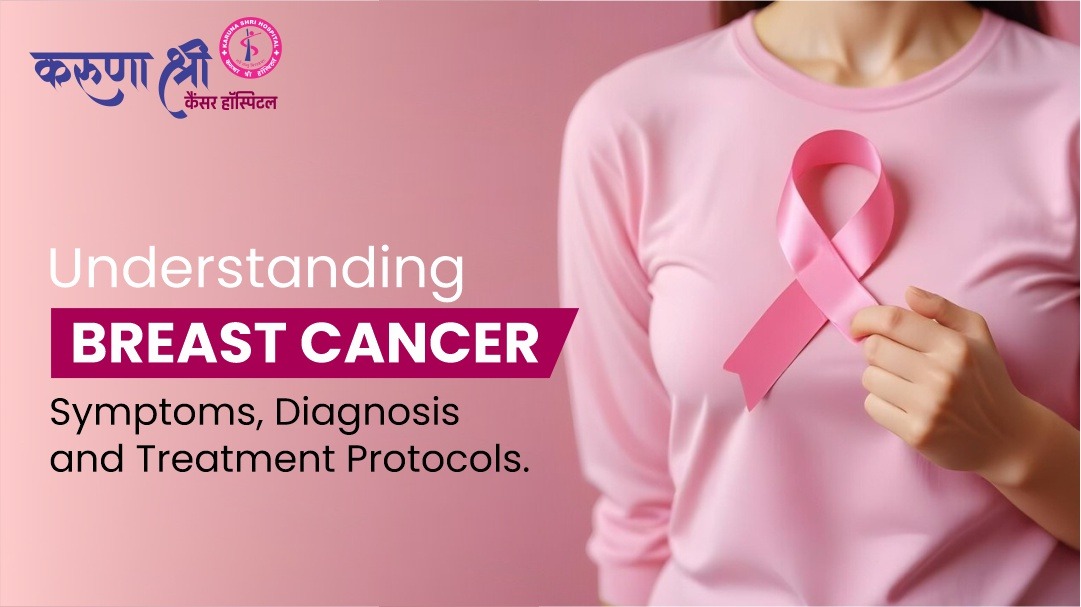By Dr. Prashant Kaser, Director, Karuna Shri Cancer Hospital, Raipur, Chhattisgarh
Breast cancer is a significant health concern affecting millions of women worldwide. At Karuna Shri Cancer Hospital, we strive to provide comprehensive care, support, and the latest treatments to those battling this disease. Understanding breast cancer, its symptoms, diagnostic processes, and treatment options is crucial in managing and overcoming this condition.
Recognizing the Symptoms
Early detection of breast cancer can significantly improve the chances of successful treatment. Here are some common symptoms to be aware of:
- Lump in the Breast or Armpit: One of the most common signs is a new lump or mass in the breast or armpit. These lumps are often painless, hard, and have irregular edges, but they can also be tender, soft, or rounded.
- Changes in Breast Shape or Size: Noticeable changes in the size, shape, or appearance of the breast should not be ignored.
- Skin Changes: Any redness, dimpling, puckering, or thickening of the skin on the breast or nipple should be evaluated by a healthcare professional.
- Nipple Discharge: Unusual discharge from the nipple, particularly if it is bloody, warrants medical attention.
- Nipple Retraction: If the nipple begins to turn inward or becomes inverted, it can be a sign of underlying issues.
The Diagnostic Journey
Accurate diagnosis is the foundation of effective breast cancer treatment. Here are the standard steps involved in diagnosing breast cancer:
- Clinical Breast Exam: A physical examination of the breasts by a healthcare provider to check for lumps or other abnormalities.
- Mammography: This specialized X-ray of the breast is a common screening tool that can detect tumors that are too small to be felt.
- Ultrasound: Often used alongside mammography, ultrasound helps distinguish between solid masses and fluid-filled cysts.
- Biopsy: If an abnormality is detected, a biopsy is performed to remove a small sample of breast tissue for laboratory analysis. This confirms whether the cells are cancerous.
- MRI: Magnetic Resonance Imaging may be used to get a detailed view of the breast and to assess the extent of the disease.
- Treatment Protocols: A Multi-faceted Approach
Treatment for breast cancer is highly individualized, depending on the type, stage, and characteristics of the cancer, as well as the patient’s overall health and preferences. Here are the primary treatment modalities: - Surgery: Surgical options include lumpectomy (removal of the tumor and some surrounding tissue) or mastectomy (removal of one or both breasts). Sentinel node biopsy or axillary lymph node dissection may also be performed to check for cancer spread.
- Radiation Therapy: This treatment uses high-energy waves to target and destroy cancer cells. It is often used after surgery to eliminate any remaining cancer cells.
- Chemotherapy: Chemotherapy involves the use of drugs to kill cancer cells. It can be administered before surgery (neoadjuvant chemotherapy) to shrink tumors or after surgery (adjuvant chemotherapy) to reduce the risk of recurrence.
- Hormone Therapy: For cancers that are hormone receptor-positive, hormone therapy can help block the body’s natural hormones (estrogen and progesterone) that may promote cancer growth.
- Targeted Therapy: Targeted therapy is a revolutionary approach that specifically targets cancer cells without affecting normal cells. Drugs like trastuzumab (Herceptin) target HER2-positive breast cancers, which have high levels of the HER2 protein promoting cancer cell growth.
- Immunotherapy: This treatment harnesses the body’s immune system to fight cancer. It is being explored in various clinical trials for breast cancer.
The Promise of Targeted Therapy
Targeted therapy represents a significant advancement in breast cancer treatment. Unlike traditional chemotherapy, which can affect both healthy and cancerous cells, targeted therapy zeroes in on specific molecules involved in cancer growth. This precision reduces side effects and improves treatment efficacy.
One notable example is trastuzumab, a monoclonal antibody that targets the HER2 protein. HER2-positive breast cancers tend to be more aggressive, but trastuzumab has transformed the prognosis for many patients with this subtype.
Conclusion
Breast cancer is a complex and challenging disease, but advances in medical science have provided us with a variety of effective tools to combat it. At Karuna Shri Cancer Hospital, we are committed to offering the best possible care, from early detection to the latest treatment options. By understanding the symptoms, undergoing timely diagnosis, and exploring all treatment avenues, we can improve outcomes and offer hope to those affected by breast cancer.
For more information or to schedule a consultation, please contact Karuna Shri Cancer Hospital, Raipur, Chhattisgarh. Together, we can fight breast cancer and work towards a healthier future.

